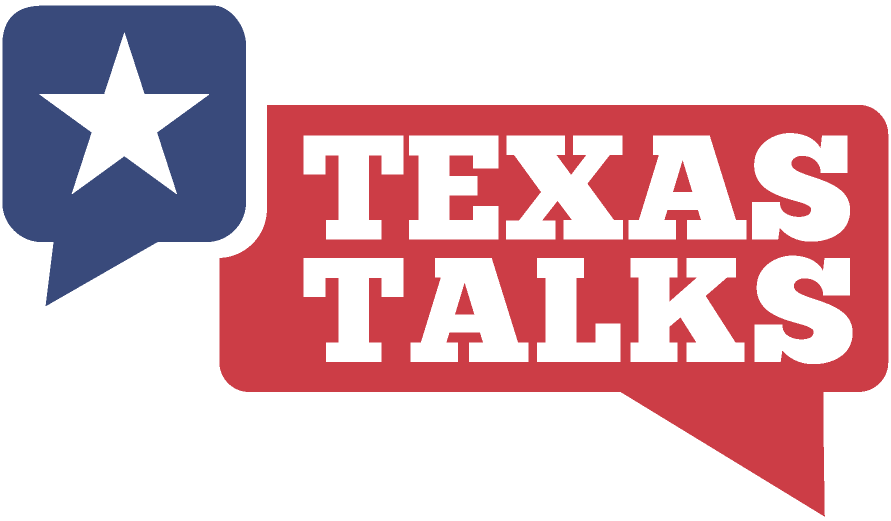
An ongoing series of interactive webinars, Texas Talks feature a presenter/moderator format with an audience question and answer session. Presenters include authors, professors, graduate students and independent historians and topics range from the Civil War to 20th Century immigration and Women's history to Travel Tourism and much more.
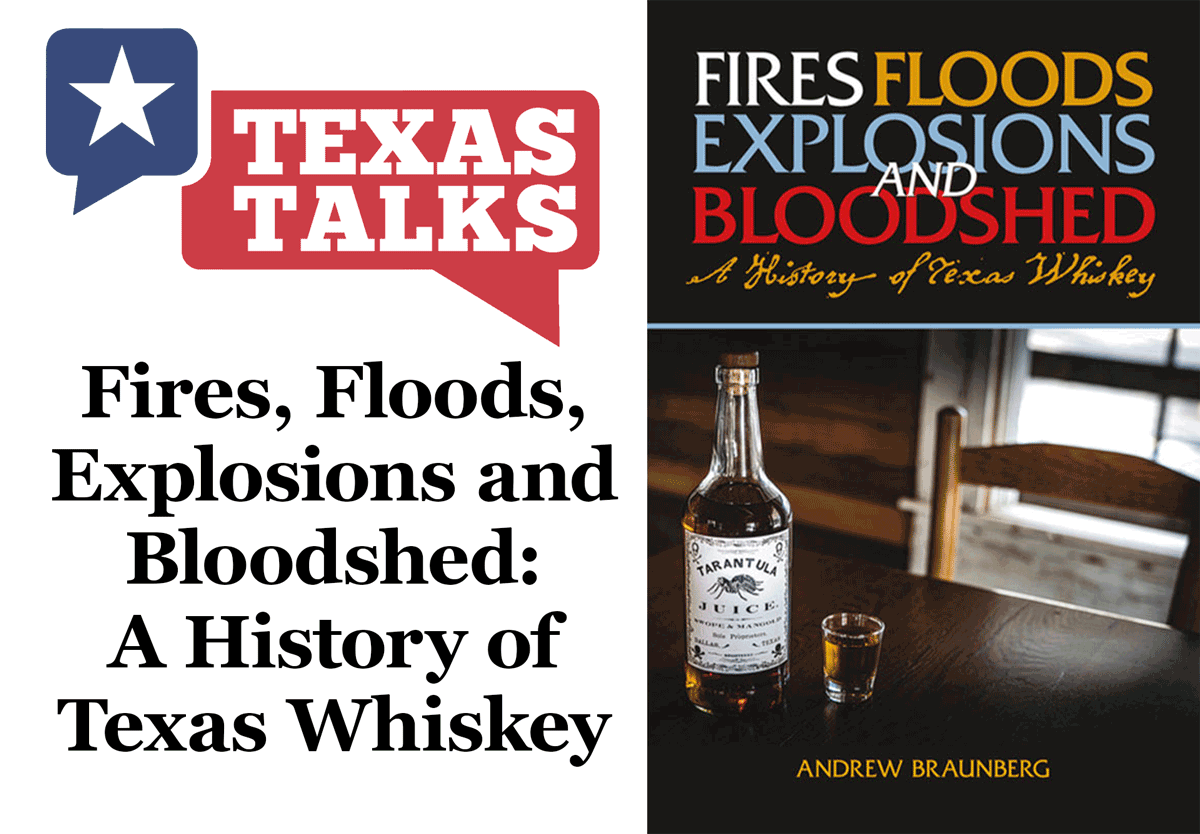
When Americans settled Texas in the 1830s, they brought their booze with them and found some made by the locals when they got here! Before long, the Lone Star State had a thriving distillery business, more than a century ahead of modern craft distillers that are changing the face of the spirits industry today. This is a fascinating history filled all too frequently with floods, fires, explosions, and lots of bad luck. Had the development of Texas happened a little differently, the state might have well become a major whiskey producer intertwined with barbed wire, refrigeration, cattle, railways, oil, and cooperage all coming into play.
Texas distilling is older than both the American and Texan Republics, but the history of transforming grains into whiskey in Texas goes back to at least the early 1840s. No spirit is more associated with the state’s frontier history than American whiskey. But even during its wildest days, there was a vocal prohibitionist element in Texas that was working to outlaw distilleries, and more importantly, close the saloons. Texas distillers also made liquor for the Confederate war effort, and operations in Tyler and near present day Denison played an often-overlooked role in supporting the troops in the field with medicinal whiskey. After the war, home-grown Texas whiskey found a market and seemed destined to takes its place among the great American spirits of its day.
Purchase book: https://www.tamupress.com/book/9781649670168/fires-floods-explosions-and-bloodshed/
ABOUT THE AUTHOR
ANDREW BRAUNBERG is the co-founder of Still Austin Whiskey Co. His background in Engineering Physics, Science Technology, and Public Policy, as well as his business experience, makes him highly regarded expert, analyst, and consultant across the distilling industry.
------------------------------
Texas Talks is made possible in part by a grant from Humanities Texas, the state affiliate for the National Endowment for the Humanities.
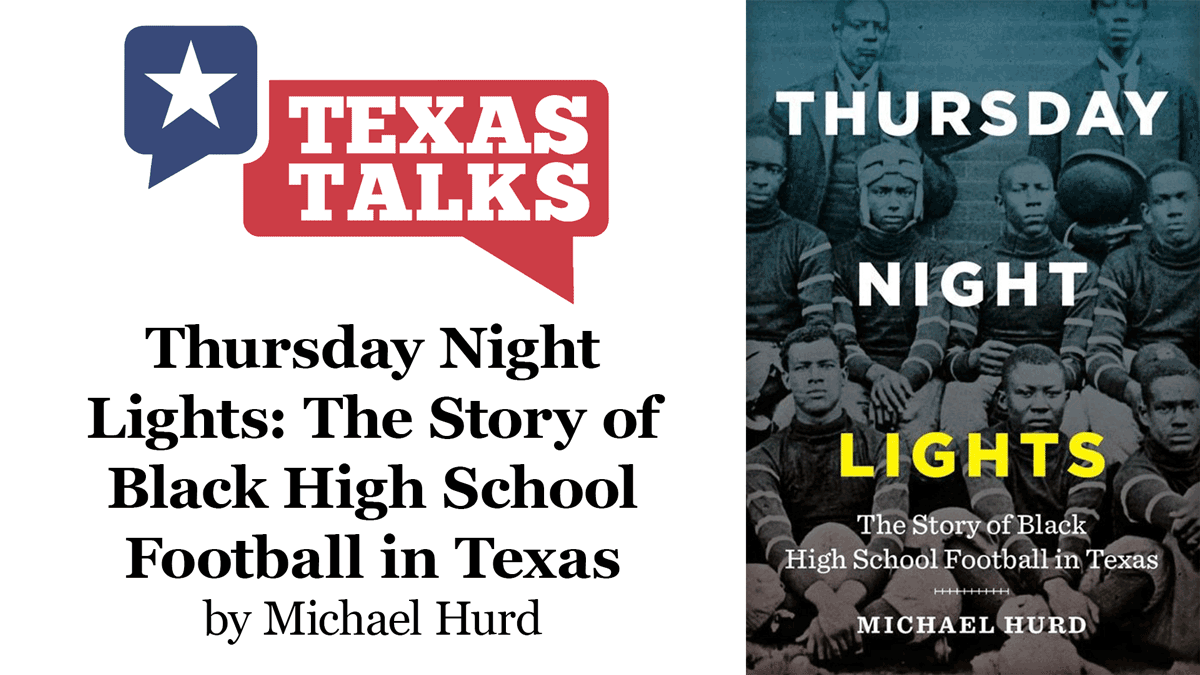
At a time when “Friday night lights” shone only on white high school football games, African American teams across Texas burned up the gridiron on Wednesday and Thursday nights. The segregated high schools in the Prairie View Interscholastic League (the African American counterpart of the University Interscholastic League, which excluded black schools from membership until 1967) created an exciting brand of football that produced hundreds of outstanding players, many of whom became college All-Americans, All-Pros, and Pro Football Hall of Famers, including NFL greats such as “Mean” Joe Green (Temple Dunbar), Otis Taylor (Houston Worthing), Dick “Night Train” Lane (Austin Anderson), Ken Houston (Lufkin Dunbar), and Bubba Smith (Beaumont Charlton-Pollard).
Thursday Night Lights tells the inspiring, largely unknown story of African American high school football in Texas. Drawing on interviews, newspaper stories, and memorabilia, Michael Hurd introduces the players, coaches, schools, and towns where African Americans built powerhouse football programs under the PVIL leadership. He covers fifty years (1920–1970) of high school football history, including championship seasons and legendary rivalries such as the annual Turkey Day Classic game between Houston schools Jack Yates and Phillis Wheatley, which drew standing-room-only crowds of up to 40,000, making it the largest prep sports event in postwar America. In telling this story, Hurd explains why the PVIL was necessary, traces its development, and shows how football offered a potent source of pride and ambition in the black community, helping black kids succeed both athletically and educationally in a racist society.
Link to buy: https://utpress.utexas.edu/9781477318300/thursday-night-lights/
About the Author:
Michael Hurd is the director of Prairie View A&M University’s Texas Institute for the Preservation of History and Culture, which documents the history of African American Texans. He has worked as a sports writer for the Houston Post, the Austin American-Statesman, USA Today, and Yahoo Sports. Hurd’s previous books include Black College Football, 1892–1992: One Hundred Years of History, Education, and Pride. For more than a decade, he served as a member of the National Football Foundation’s Honors Court for Divisional Players, the group that chooses small college players for the College Football Hall of Fame, and he currently serves on the selection committee for the Black College Football Hall of Fame.
------------------------------
Texas Talks is made possible in part by a grant from Humanities Texas, the state affiliate for the National Endowment for the Humanities.
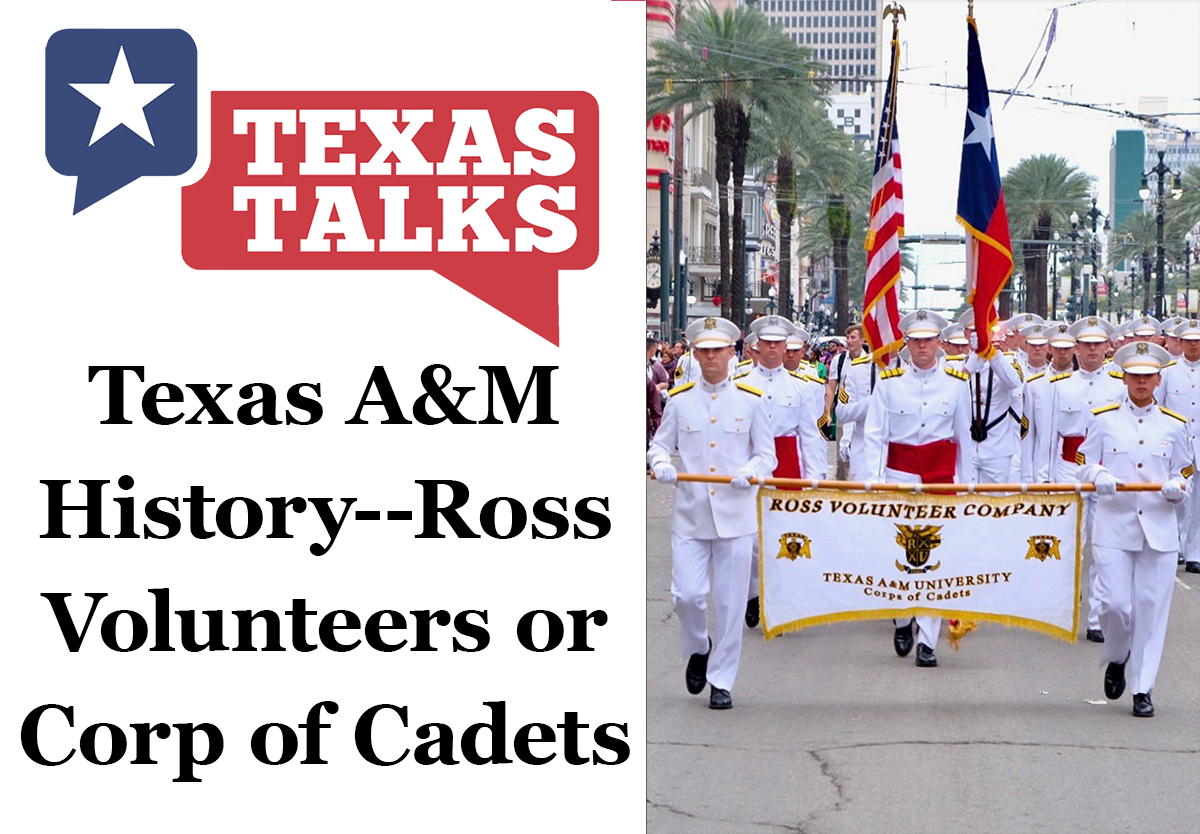
Founded in 1887 as the Scott Volunteers, it was renamed in 1898 after Texas A&M's President, Lawrence Sullivan Ross.
This elite group consists of junior and senior cadets chosen for their honor and character. Each fall, 72 juniors are selected through a confidential process. The RV uniform is distinctive, with officers wearing a silk red sash. They perform ceremonies like the 3-volley, 21-gun salute and participate in parades, including Mardi Gras in New Orleans. They also serve at gubernatorial events, weddings, and funerals.
-------------------------------
About the Presenter:
Michael Stephenson is a senior Electrical Engineering Honors Student at Texas A&M and is a member of the Corps of Cadets. He currently serves as the Historian for the Ross Volunteer Company and as the Executive Officer for Gator 2. Michael was born in Lichtenfels, Germany. Michael lived in six different countries with his family due to his father’s service in the U.S. Army. He graduated from Brussels American School in Brussels, Belgium in 2020. At Texas A&M, Michael is very active in the Corps of Cadets and other aspects of student life. He is bible study leader with Fellowship of Catholic University Students (FOCUS) and volunteers at St. Mary’s Catholic Church. He was also employed by the Mathematics Department as a grader. Michael interned with HPE in 2021 and Raytheon in 2022 to further advance his education in Electrical Engineering. Michael intends to pursue a Master’s Degree in Electrical Engineering at Texas A&M after completing his Bachelor’s Degree in 2024. Michael earned Eagle Scout with Silver Palm and is a member of the Order of the Arrow. Michael enjoys golfing, traveling, reading, watching sports and being a member of the 12th Man supporting the Texas Aggies. He has a special interest in the history of the ancient world, the history of the United States , and the history of Texas A&M.
-------------------------------
Texas Talks is made possible in part from a grant from Humanities Texas, the state affiliate of the National Endowment for the Humanities.
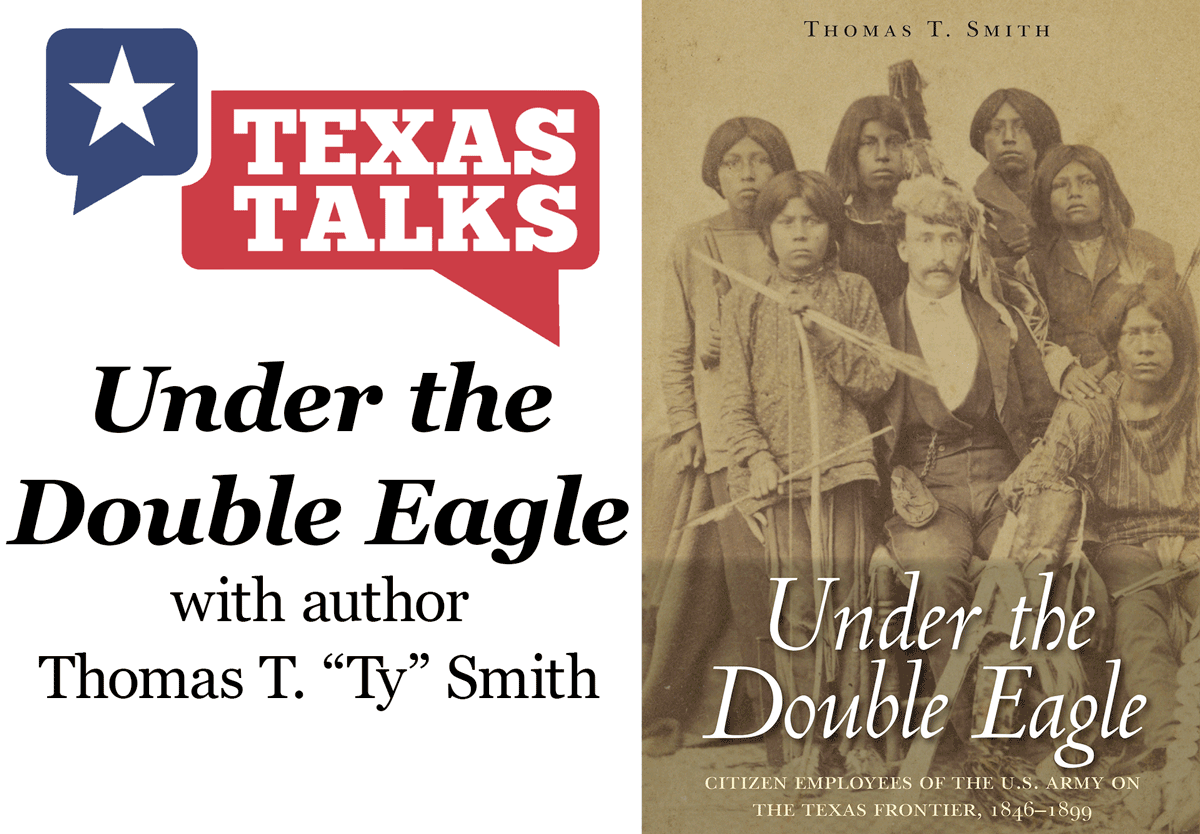
In the first detailed study of its kind, Col. (Ret.) Thomas T. “Ty” Smith, known for his extensive research and writing on the U.S. Army in Texas, presents an in-depth examination of the civilian employees of the army in the nineteenth century. Under the Double Eagle: Citizen Employees of the U.S. Army on the Texas Frontier, 1846–1899 reflects the fact that citizens employed by the frontier army in Texas came under the impact of two symbolic eagles. The first was the eagle impressed into gilt buttons on the uniforms of the army officers for whom they labored. The second was the double eagle twenty-dollar gold piece they often received at the pay table, especially in the antebellum era, when all army wages were paid in hard coin rather than paper. Those two eagles had a lasting impact on the Texas frontier.
Between 1846 and 1899, the U.S. Army in Texas issued more than $4 million in wages to citizen employees. Smith offers a detailed accounting of these wages, but his primary interest is in the people. After an introductory essay providing an overview, historical context, and demographic profiles, the author examines post by post the 111 army forts, camps, and stations documenting a civilian employee. He provides a brief history of each post, the names of the individuals employed, and where possible the position, wage, and length of employment. Altogether Smith names 1,721 army employees, and sample biographies demonstrate the diversity of the characters involved. Included among these employees are 309 civilian physicians. In the appendix, Smith offers biographies of 180 of these contract doctors who greatly contributed to the advance of medicine in Texas. This work will be of importance to historians, to the general public with an interest in Texas history or Texas medicine, and especially genealogists.
Published by Texas State Historical Association
978-1-62511-057-2 printed case, $100
6 x 9 in
512 pp., 76 tables, 13 black
978-1-62511-073-2 ebook, $35
-------------------------------
About the author:
Thomas T. “Ty” Smith, Col. (Ret.) U. S. Army, of San Antonio, is the author of numerous articles and books including The Old Army in Texas: A Research Guide to the U. S. Army in Nineteenth-Century Texas (Texas State Historical Association, 2000), and The Old Army in the Big Bend of Texas: The Last Cavalry Frontier, 1911–1921 (Texas State Historical Association, 2018). He is a fellow of the Texas State Historical Association.
-------------------------------
Texas Talks is made possible in part from a grant from Humanities Texas, the state affiliate of the National Endowment for the Humanities.
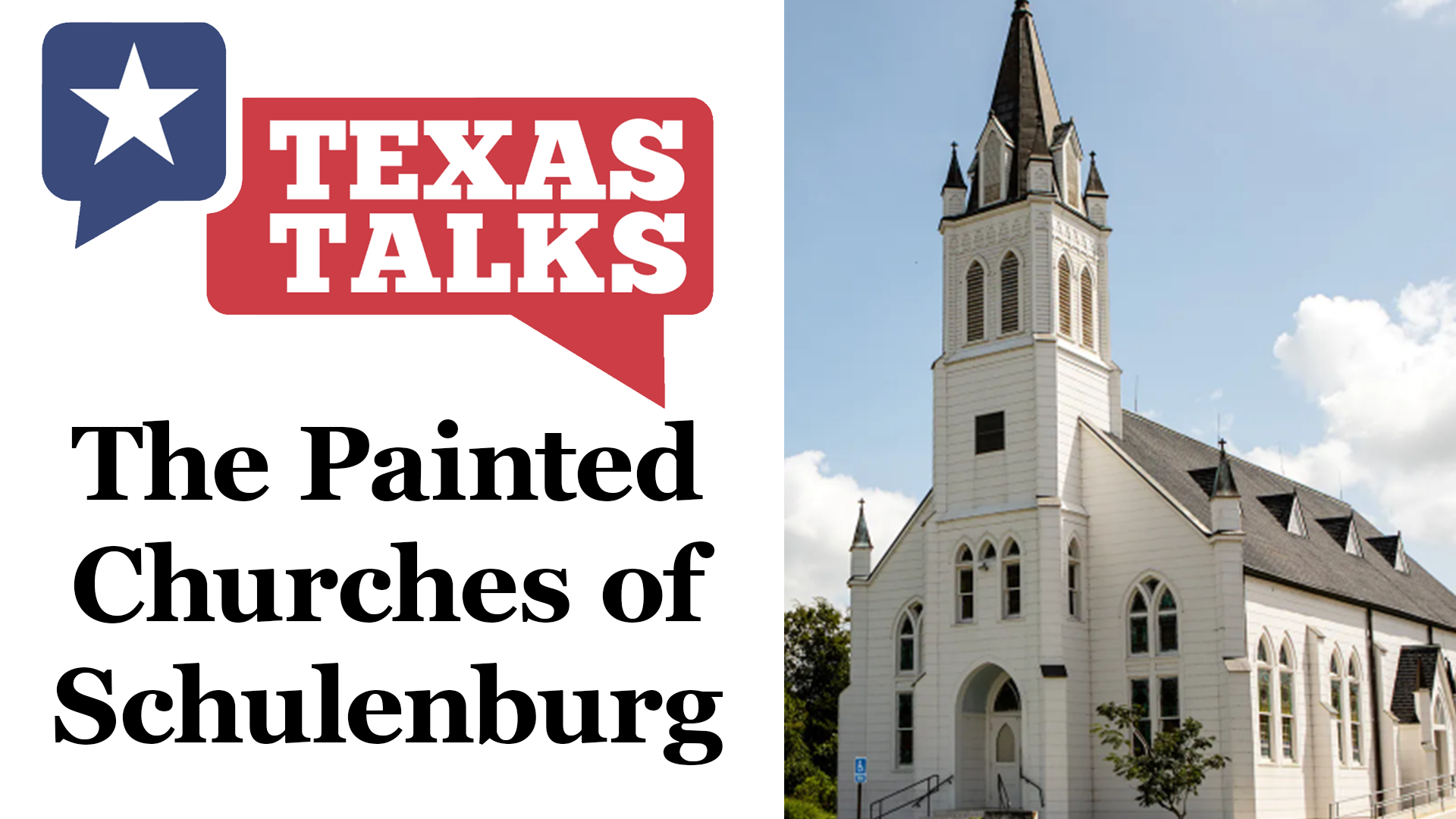
The Painted Churches of Schulenburg
presented by Terri Wagner of the Schulenberg Chamber of Commerce
The Painted Churches are a group of historic churches known for their vibrant and intricate interior frescoes and decorative art. These churches were built by European immigrants, particularly Czech and German communities, who settled in Texas in the 19th and early 20th centuries.
The immigrants brought with them a rich tradition of religious art and architecture, and they adorned the interiors of their churches with colorful paintings and elaborate decorations. The purpose of these painted churches was not only to serve as places of worship but also to create a sense of beauty and reverence within the community.
The Painted Churches are located in the communities of Dubina, High Hill, Praha, and Ammannsville. They appear unassuming as you approach them, but as you enter the front doors prepare to have your breath taken away by the incredible beauty found inside.
To book a Tour of the Painted Churches or for more information, please call (979) 743-4514 or visit https://www.schulenburgchamber.org/painted-churches-tour.
-------------------------------
Texas Talks is made possible in part from a grant from Humanities Texas, the state affiliate of the National Endowment for the Humanities.
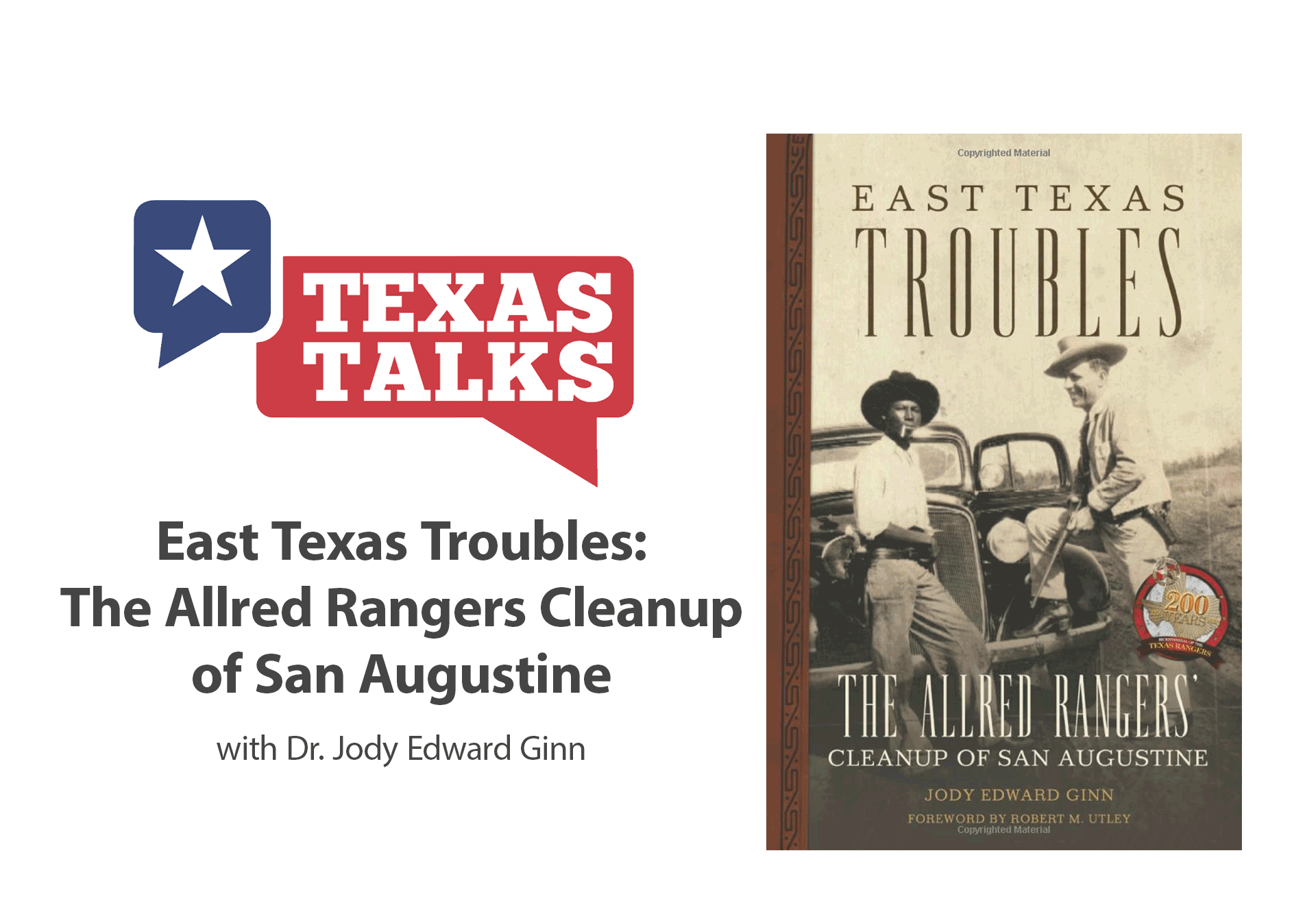
A captivating Texas Talk on the Texas Rangers, who celebrate their 200th year as a law enforcement agency. From their creation in 1823 by Stephen F Austin to the present day, the Rangers have played a vital role in Texas history. This session will highlight the transformation of the Rangers under Governor James Allred and the fascinating story of their alliance with black residents of the Jim Crow South.
Featuring Dr. Jody Ginn, Director of Development for the Texas Ranger Hall of Fame & Museum, this talk explores the dark era of a corrupt Ranger regime in East Texas and Governor Allred's successful reform efforts. Dr. Jody Ginn’s latest book, East Texas Troubles: The Allred Rangers Cleanup of San Augustine, chronicles the circumstances surrounding the origins of the Texas Department of Public Safety (DPS). In this story of a rural Texas community’s resurrection, Ginn reveals a multifaceted history of the reform of the Texas Rangers and of an unexpected alliance between the legendary frontier lawmen and black residents of the Jim Crow South.
An established and respected Texas historian, Dr. Ginn has authored numerous publications on various topics, including The Texas Rangers, American Indians, and Palmito Ranch. Dr. Ginn’s personal connections to the Texas Rangers date back almost two centuries, when his Austin colonist Texas ancestors served as "Home Guard” Rangers during the Civil War. However, it was his research into the career of his great-grand uncle, Dan Hines – one of the first DPS Texas Rangers – that drew him into the world of professional Texas Rangers’ history. In addition, Ginn has been an expert commentator for numerous online podcasts, and for national and international print media outlets. Notably, he worked as a publicity consultant and on-screen expert commentator on the 2019 blockbuster Netflix Film, The Highwaymen, starring Kevin Costner, Woody Harrelson and Kathy Bates.
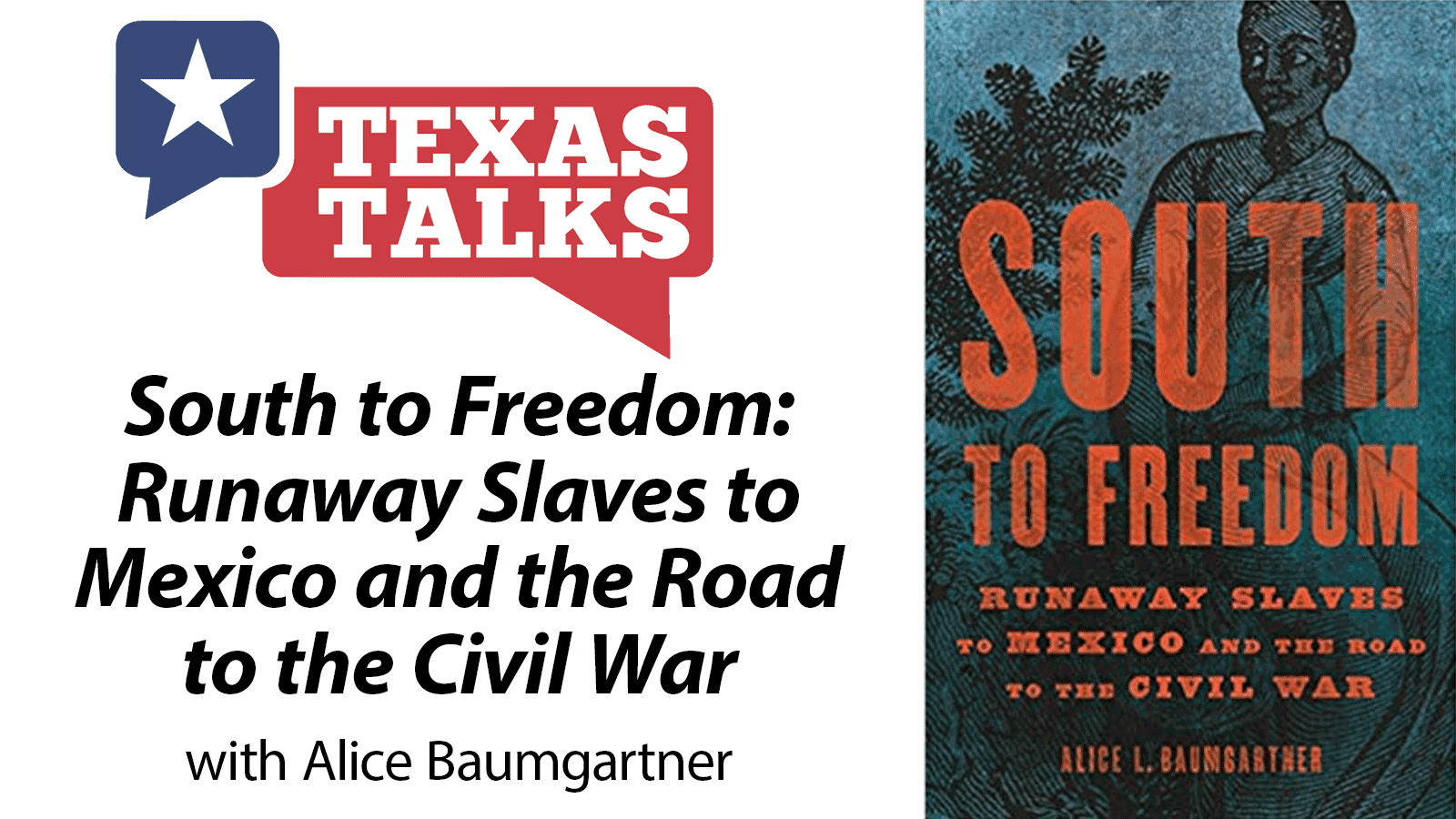
Historian Alice Baumgartner tells the surprising story of enslaved people in the 19th century who escaped not to the northern states or Canada but to Mexico. Tracing how Mexico’s abolition of slavery in 1837 and increasingly radical antislavery policies spurred on the growing crisis between the states north of the border, Baumgartner reorients our understanding of the American Civil War. Though fewer in number than those who fled north on the Underground Railroad, the stories of those who fled south to freedom are no less important, providing a revelatory and necessary perspective on slavery in North America.
Alice Baumgartner is an assistant professor of history at the University of Southern California. She holds a Ph.D. from Yale University and an M.Phil in Latin American Studies from the University of Oxford. Her first book, South to Freedom: Runaway Slaves to Mexico and the Road to Civil War, was selected as an Editor's Choice by the New York Times Book Review and as a finalist for the LA Times Book Prize in History.
https://www.hachettebookgroup.com/titles/alice-l-baumgartner/south-to-freedom/9781541617773/?lens=basic-books
https://alicebaumgartner.com/
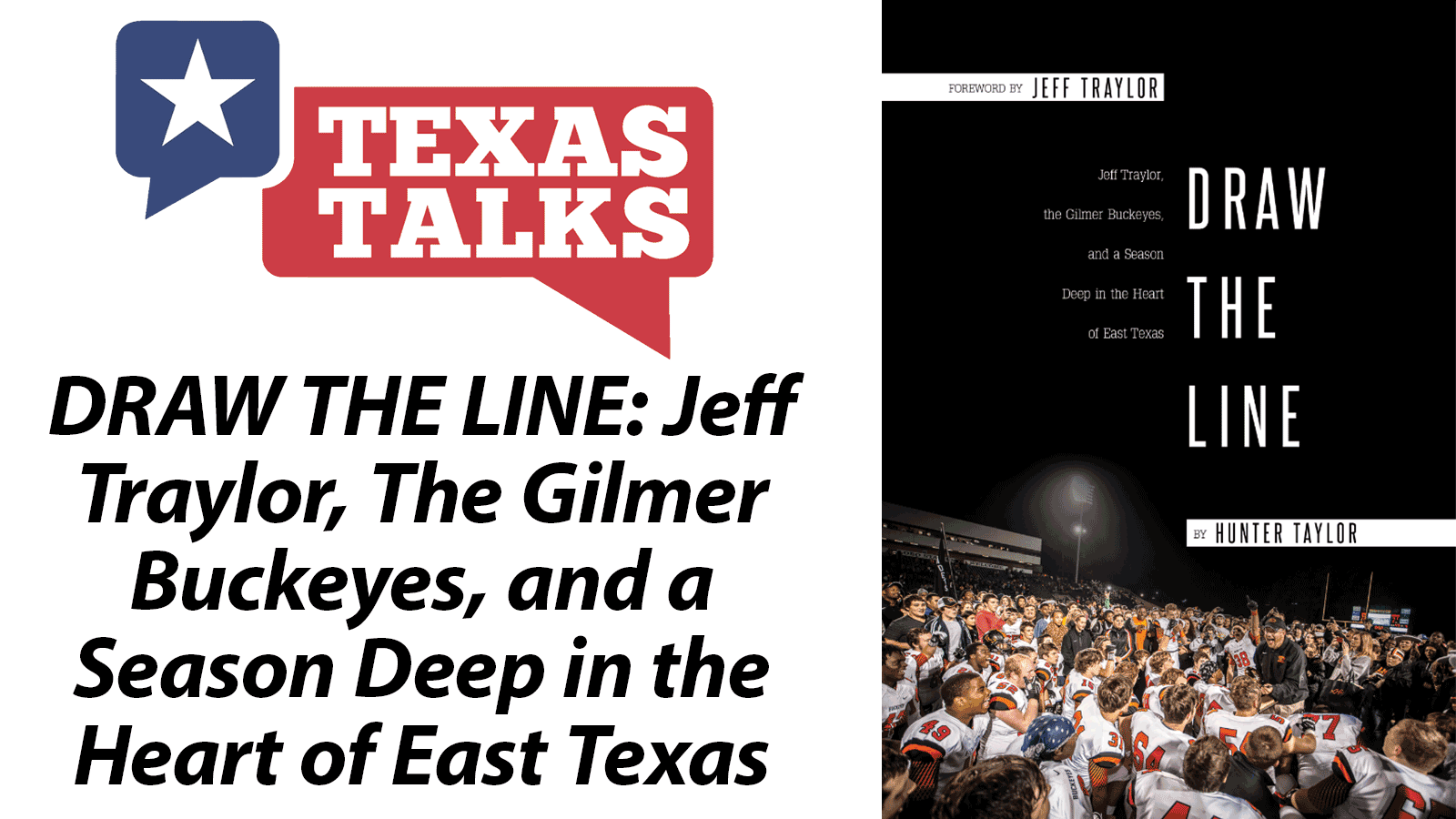
Join us as Dr. Hunter A. Taylor, of the University of Mississippi and Moderator Dr. Charles Breithaupt, University Interscholastic League (UT), discuss Draw the Line: Jeff Traylor, The Gilmer Buckeyes, and a Season Deep in the Heart of East Texas (2022). Dr. Taylor's book examines the impact a high school football staff made in rural East Texas over the course of 30 years. The book is told through the lens of current UTSA head football coach Jeff Traylor and his long-time colleagues.

Join Jennifer Ross-Nazzal as she talks about Making Space for Women, her latest book, which looks at the women of the NASA Johnson Space Center. Her Texas Talk will highlight the female experience at JSC over the course of the Center’s history using stories from her book and other interviews conducted for the JSC Oral History Project. Beginning with the creation of the Manned Spacecraft Center and ending with the International Space Station, Making Space for Women explores how careers for women at JSC changed over time as the workforce became more diverse and fields once closed to women opened to them.
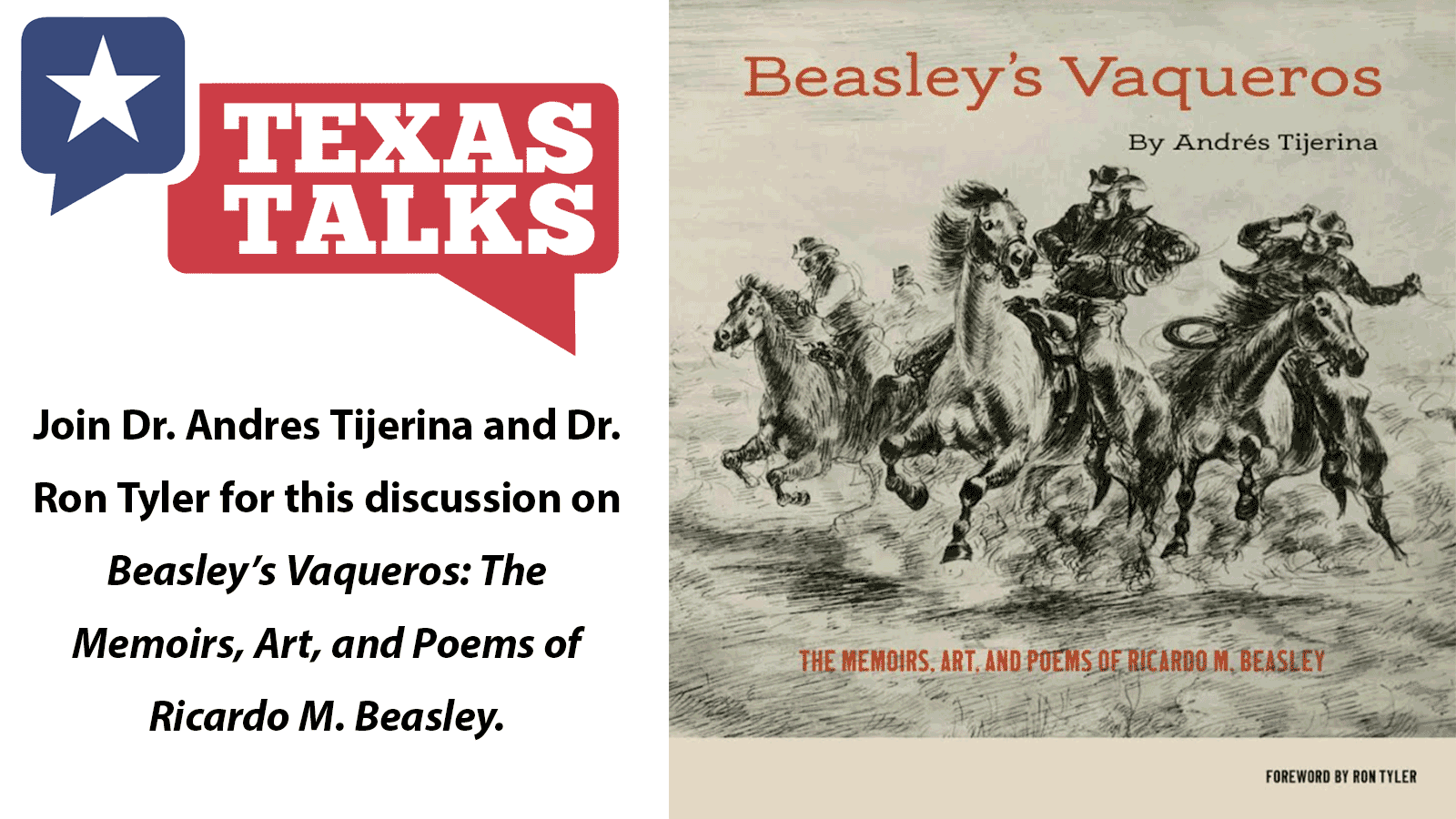
Beasley's Vaqueros presents the life and work of South Texas artist Ricardo M. Beasley. Between roughly 1940 and 1980, Beasley produced dozens of pen-and-ink drawings (36 of which are reproduced here) of working vaqueros, the Tejano cowboys of South Texas. His vibrant, action-packed scenes capture the dangers as well as the joys of working with cattle, horses, and an often-unforgiving landscape of cactus and mesquite. In addition to a selection of Beasley's work, historian Andrés Tijerina has collected and translated an extensive interview with the artist and several of his poems. Despite having lived much of his life after World War II, Beasley's art and words capture a world in which people and events from decades before his time are just as immediate—perhaps even more so—than events of the present day. More than just a testament to the talents of a singular, self-taught artist, Beasley's Vaqueros is a record of vaquero life in South Texas that spans the centuries. The book features a foreword by Ron Tyler, the former director of the Amon Carter Museum of American Art in Fort Worth.
The 2022-2023 season of Texas Talks is made possible in part by a grant from Humanities Texas, the State Affiliate of the National Endowment for the Humanities.
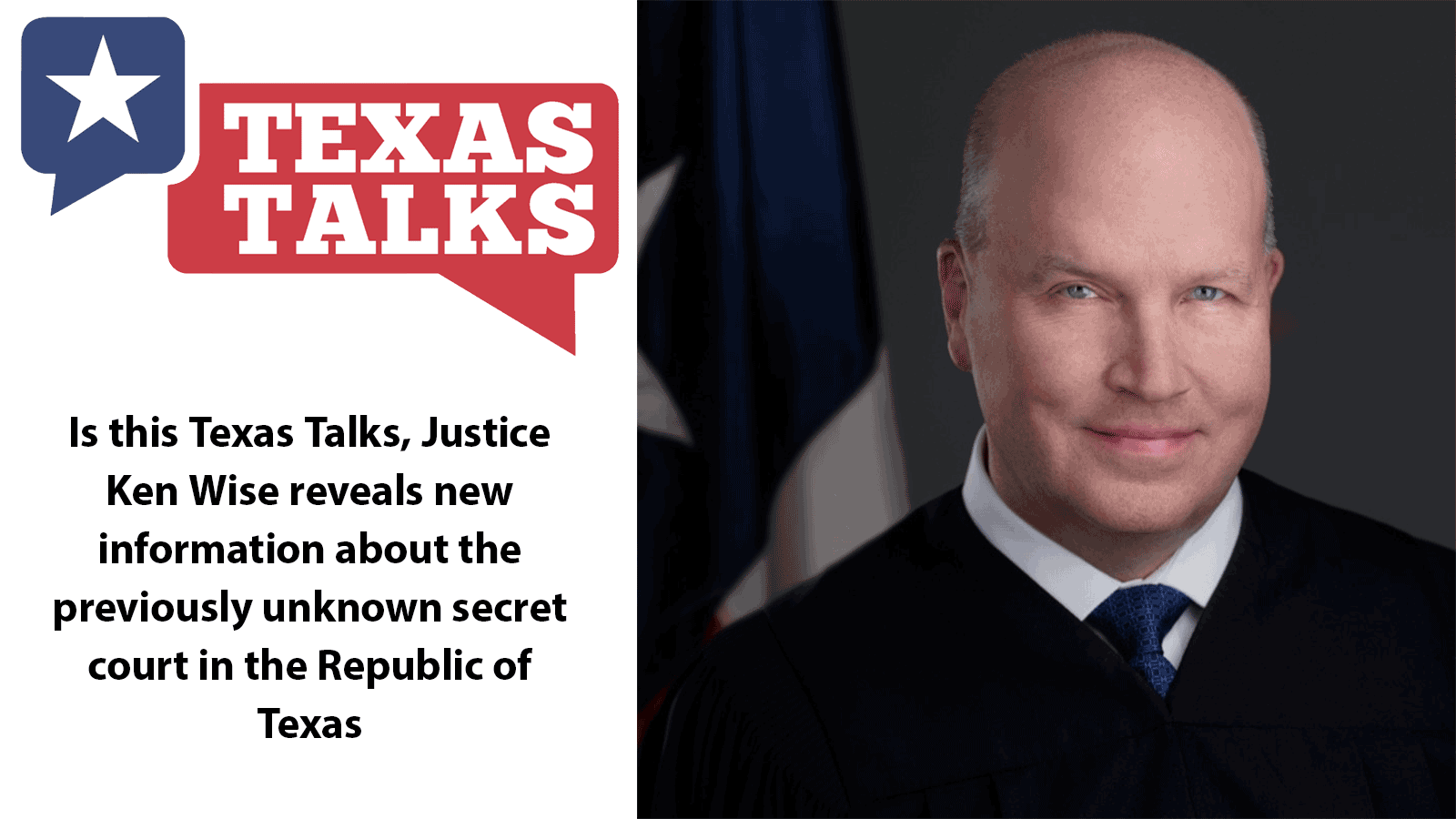
The battle of San Jacinto gave Texas its independence, but also an international crisis. Needing to act quickly, President David Burnet issued an executive order creating a judicial system. The emergency was resolved, in part, but that wasn’t the end of the story for Burnet’s court. In this Texas Talks, Justice Ken Wise will reveal some information not previously known about the secret court of the Republic of Texas. Justice Wise sits on the 14th Court of Appeals in Houston and is the creator and host of the popular Texas history podcast Wise About Texas, which is heard by over 1.3 million people in 152 countries around the world.
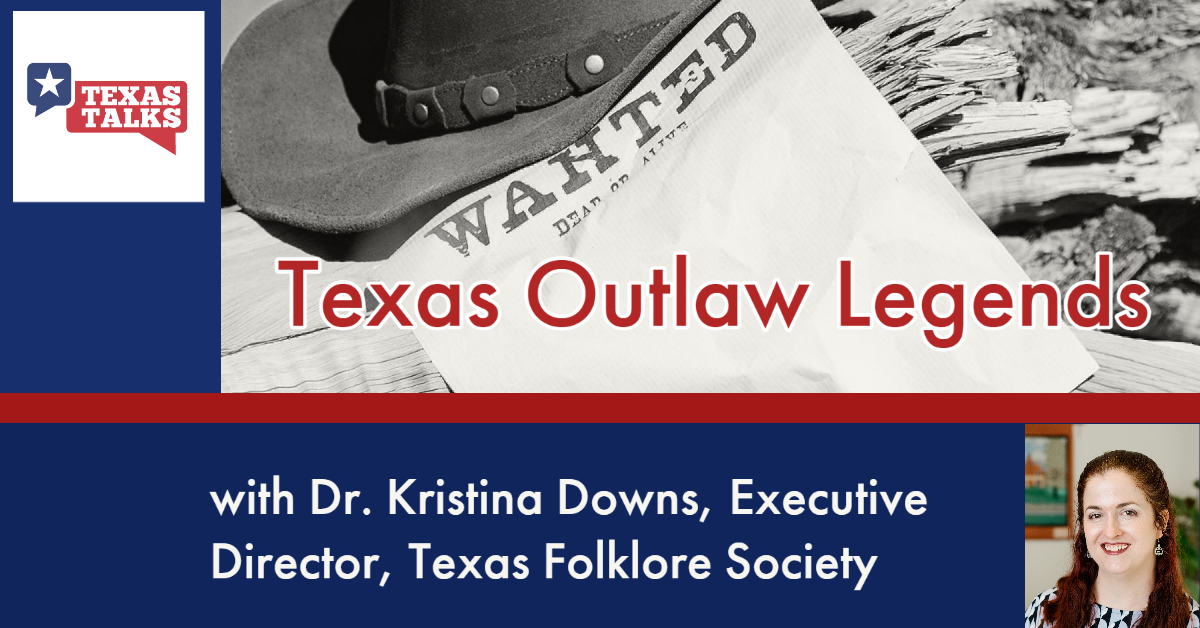
Dr. Kristina Downs, Assistant Professor of English at Tarleton State University and the Executive Director of the Texas Folklore Society, examines outlaw legends through the lens of Texas history and folklore. While outlaw legends are not unique to Texas, the Lone Star State does have an unusually high concentration of them. This Talk explores common themes and motifs among outlaw legends, including social banditry and faked deaths and considers how Texas history and folklore have given the state’s legends their specific flavor.

TSHA’s eBay Auction
We are a 501(c)3 non-profit organization, all proceeds support our many programs and publications.